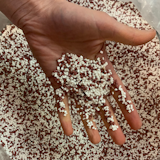Read These 5 Tips Before Buying Your Next Sofa
A couch is a big purchase. While aesthetic ideals vary, two general parameters go without saying: It should be the appropriate size for the room and undeniably comfortable. Sustainable furnishings maker Model No. would like to add nontoxic and earth-friendly to this list. The Bay Area–based company says it has created the "healthiest" sofa in the world with the launch of its beautiful new Platform series. Here, the brand’s senior VP of product development and design, Kevin Wildes, and its director of design, Michael Vance, share tips on how to buy furniture that won’t make you or the planet sick.
1. Understand the Concept of Greenwashing
Greenwashing is a blanket term for overstatement of sustainable practices. Before you fall in love with a sofa, do some research on how the manufacturer follows through on its environmental pledges: What materials are used? How and where are the furnishings produced? Answers to these questions should guide your choice. "So many companies use marketing speak to make it sound like they care, but often there’s little substance to these claims," says Wildes. "We all need to be more aware of what we do with our purchasing power."
2. Know Where the Wood Came From
The wood frame of that sofa you’ve be eyeing may have been shipped long distances or sourced from forests that should be protected. Instead of participating in harmful or inefficient cycles, look for reclaimed or FSC (Forest Stewardship Council) certification as a sign of responsible sourcing. Wildes says: "We stick to FSC-certified hardwoods like walnut and ash in our production, and we try to source locally when possible."
Model No. manufactures and hand-finishes each piece on demand in its Oakland-based micro factory using sustainable materials like FSC-certified hardwoods. Biodegradability, energy consumption from manufacturing, and shipping practices also matter when it comes to assessing the sustainability of your sofa.
3. Don’t Overlook What You Can’t See
Everyone jokes about new couch smell, but Wildes confirms it’s no laughing matter. "Many pieces on the market can make you sick over time," he explains. "Even after you stop smelling the chemicals, they can still be off-gassing in your home. Cushions are the real culprit, and we worked hard on this aspect of the design," Wildes adds. The brand’s solution was to use organic, GOLS-certified latex foam that’s naturally fire resistant and therefore doesn’t need chemical treatment.
4. Consider Buying On-Demand Versus Premade
Flexibility is the mark of most progressive manufacturing methods these days. Model No., for instance, makes its wares on a per-order basis. "We manufacture our goods domestically and on demand in, thus eliminating waste and excess inventory," says Wildes. "And our future trade-in program for all products—not just our 3D-printed designs—will allow us to grind down old items to make something new, ensuring that our manufacturing process is truly circular."
5. Choose Natural Fabrics
Upholstery is crucial, so make sure it’s both plush and responsibly made. "We use an incredibly luxurious wool fabric that is certified cradle-to-cradle, which means it’s organic and can be recycled," Vance says. "We’re also greatly interested in plant-based leathers that have been vegan-tanned and upcycled natural leathers. We’d like to see these used more often in the industry."
Learn more about Model No.’s new Platform series—now available with free white glove shipping—at model-no.com.
Related Reading:
Model No.’s Quest to Design the "Healthiest" Sofa Ever
Published
Last Updated
Get the Dwell Newsletter
Be the first to see our latest home tours, design news, and more.





